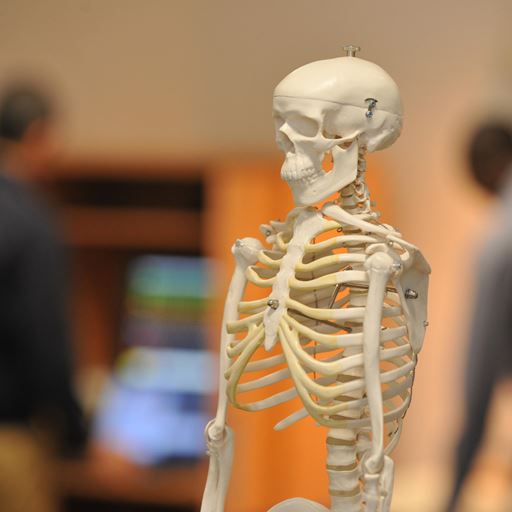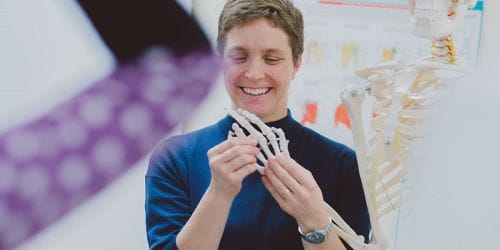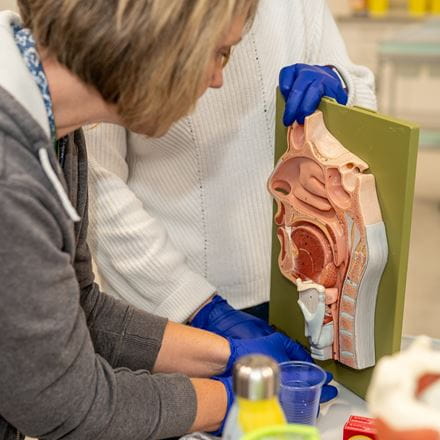Undergraduate study

Committed to improving lives
Got mettle, zeal and bold ambition? Got a heart of gold? Thrive on advocating for others?
Then the School of Health and Social Care at Essex is the right place for you. We're a lively, supportive community of students and staff who're passionate about progressing knowledge in our field. We're looking for the change-makers of the future - people who're prepared to evaluate and challenge current practice to improve patient and customer experience.
Depending on which of our undergraduate courses you choose, you could be using your Social Work skills to support refugees in Cyprus or learning about healthcare in Melbourne, Australia*. All of our undergraduate courses include placement opportunities which benefit our local communities, and some offer the option to study abroad for a year too. Alternatively if traditional study isn't for you, we offer apprenticeships in health science and nursing.
*Please note that these courses may be subject to additional costs.
- 91% of our Health and Social Care undergraduate graduates are in employment or further study (Graduate Outcomes 2024)
- We're the first department in the University to have been awarded the Athena Swan Silver Award for gender equality
- 10th for student positivity in social work (NSS 2025, English Broad Discipline Universities)
So, what do we have to offer?
Study abroad and placements years
Did you know that if you are thinking of studying either BSc Nursing (Adult) or BSc Nursing (Mental Health) you have the option of extending your course to four years, and spending your third year abroad?
If you're planning on studying BSc Speech and Language Therapy, you also have the option of extending your course to four years. In your third year, you can either take placement year, or your could study abroad.
For those of you who are interested in studying BA Social Work, once you have started the course, you can apply for the opportunity to swap one of your second year placements to an international placement. Previously students have enjoyed completing their placement in Cyprus working with refugees. This has given them a unique insight to the challenges faced by refugees.
Doing a placement year or studying abroad is a great way to expand your knowledge and skills set, which in turn may give you a new perspective for your final year research project. It will also give you something extra to talk about when you apply for jobs, as you'll be able to compare and contrast your experiences.
Find out more about studying abroad here.
Diversity of placements
Our School is well supported by our dedicated placements team. This team look after finding appropriate placements for our undergraduate and postgraduate preregistration and Social Work students. This means we are able to offer a wide range of placements across various settings in the East of England. This is great news for our students as it means we are able to ensure a diversity of experiences.
Getting you ready for life after graduation
Studying with us is about gaining more than just a qualification. We aim to prepare you for your career in health and social care, and will emphasise developing your leadership and research skills.
We want you to leave Essex feeling equipped to drive forward knowledge, practice and policy in your field, regardless of where you choose to work.
Apprenticeships
We offer a range of higher and degree apprenticeships that allow healthcare staff to upskill while continuing to work in the NHS.
Apprenticeships include Healthcare Assistant Practitioner, Psychological Wellbeing Practitioner, and Nursing Associate.
Application cycles for apprenticeships and the number of places available may differ from a standard university degree so do check carefully if you're thinking of applying.
BSc Nursing (Adult), BSc Nursing (Mental Health), MSci Dual Award (Adult and Mental Health)
These courses have non-academic/additional requirements to include:
An awareness of the NHS Constitution and NHS values
As part of the selection process, students will be expected to demonstrate effective communication skills alongside good knowledge and a clear understanding of the scope of work that a nurse is required to undertake as well as the significance of the NHS Constitution and its core values (you can find further information on these on the Government website).
DBS and Occupational Health Check:
You are required to have a satisfactory Occupational Health Check and enhanced Disclosure and Barring Service (DBS) Check (including child and adult barred list check) - both of these are organised by the University. Please contact our DBS team if you have any questions relating to this.
A satisfactory Overseas Criminal Record Check/Local Police Certificate is also required, in addition to a DBS Check, where you have lived outside of the UK in the last 5 years for 6 months or more.
Other:
- Applicants must be over 18 by 1 January 2025
- If you are applying for second year entry, the application deadline is 1 January 2025
- Please note, if your achieved or pending qualifications meet our requirements, you will be invited to book on to a compulsory interview.
- A satisfactory reference is required. You can find out more about our reference requirements here. We look at all applications holistically, and will consider your entry requirements, your personal statement, and your reference.
FdSc Oral Health Science
This course has additional entry requirements to include:
Awareness of the NHS constitution and values:
As part of the selection process, students will be expected to demonstrate effective communication skills alongside good knowledge and a clear understanding of the scope of work that a Dental Hygienist is required to undertake as well as the significance of the NHS Constitution and its core values (you can find further information on these on the Government website).
DBS and Occupational Health Check
You are required to have a satisfactory Occupational Health Check and enhanced Disclosure and Barring Service (DBS) Check (including child and adult barred list check) - both of these are organised by the University. Please contact our DBS team if you have any questions relating to this.
A satisfactory Overseas Criminal Record Check/Local Police Certificate is also required, in addition to a DBS Check, where you have lived outside of the UK in the last 5 years for 6 months or more.
Other:
- Applicants must be over 18 by the start of the course.
- Second year entry is not available
- Please note, if your achieved or pending qualifications and personal statement meet our requirements, you will be invited to book on to a compulsory interview.
- A satisfactory reference is required. You can find out more about our reference requirements here. We look at all applications holistically, and will consider your entry requirements, your personal statement, and your reference.
- We cannot consider applicants who need a student visa due to the high work placement percentage of this course
BSc Occupational Therapy
This course has additional entry requirements to include:
An awareness of the NHS Constitution and NHS values
As part of the selection process, students will be expected to demonstrate effective communication skills alongside good knowledge and a clear understanding of the scope of work that an Occupational Therapist is required to undertake as well as the significance of the NHS Constitution and its core values (you can find further information on these on the Government website).
DBS and Occupational Health Check
You are required to have a satisfactory Occupational Health Check and enhanced Disclosure and Barring Service (DBS) Check (including child and adult barred list check) - both of these are organised by the University.
You will also be required to register for the DBS Update Service (information relating to this service can be found here). You will need to register for this within 30 days of your DBS certificate being issued. The Update Service costs £13 per year, which the University will reimburse. You will need to keep the subscription to this Service active for the duration of your course.
If you do not register for the Update Service within 30 days, or your registration lapses, and you later attend a Placement where this is a requirement, you will have to pay for a new DBS check, which will enable you to sign up to the Update service. Please contact our DBS team if you have any questions relating to this.
A satisfactory Overseas Criminal Record Check/Local Police Certificate is also required, in addition to a DBS Check, where you have lived outside of the UK in the last 5 years for 6 months or more.
Other:
- Applicants must be over 18 by 1 January 2025.
- If you are applying for second or third year entry, the application deadline is 30 April 2024
- Please note, if your achieved or pending qualifications meet our requirements, you will be invited to book on to a compulsory interview.
- A satisfactory reference is required. You can find out more about our reference requirements here. We look at all applications holistically, and will consider your entry requirements, your personal statement, and your reference.
- Study towards admitting qualifications within the last 5 years is required. Please get in touch if you think you might not meet this requirement.
- Alongside academic criteria, applicants need to demonstrate knowledge of the scope of Occupational Therapy and practice settings, together with effective communication skills.
BSc Speech and Language Therapy
This course has additional entry requirements to include:
An awareness of the NHS Constitution and NHS values
As part of the selection process, students will be expected to demonstrate effective communication skills alongside good knowledge and a clear understanding of the scope of work that a Speech and Language Therapist is required to undertake as well as the significance of the NHS Constitution and its core values (you can find further information on these on the Government website).
DBS and Occupational Health Check
You are required to have a satisfactory Occupational Health Check and enhanced Disclosure and Barring Service (DBS) Check (including child and adult barred list check) - both of these are organised by the University.
You will also be required to register for the DBS Update Service (information relating to this service can be found here). You will need to register for this within 30 days of your DBS certificate being issued. The Update Service costs £13 per year, which the University will reimburse. You will need to keep the subscription to this Service active for the duration of your course.
If you do not register for the Update Service within 30 days, or your registration lapses, and you later attend a Placement where this is a requirement, you will have to pay for a new DBS check, which will enable you to sign up to the Update service. Please contact our DBS team if you have any questions relating to this.
A satisfactory Overseas Criminal Record Check/Local Police Certificate is also required, in addition to a DBS Check, where you have lived outside of the UK in the last 5 years for 6 months or more.
Other:
- Applicants must be over 18 by 1 December 2024.
- If you are applying for second year entry, the application deadline is 30 April 2024
- Please note, if your achieved or pending qualifications meet our requirements, you will be invited to book on to a compulsory interview.
- A satisfactory reference is required. You can find out more about our reference requirements here. We look at all applications holistically, and will consider your entry requirements, your personal statement, and your reference.
- Students accepted onto the course will undertake practice placements involving travel or lodging (funding is expected to be available to reimburse some travel and dual accommodation costs through the government funding available for health students. To find out the latest information of this please go to our Scholarships and Funding page.
- Students accepted onto the course are recommended to join RCSLT for access to closed member information and study opportunity.
Working Overseas
Applicants are strongly advised to contact the registering organisation of the country they plan to work in to check the recognition of UK qualifications and professional accreditation.
The RCSLT has a Mutual Recognition of Credentials Agreement (MRA) with some international organisations. We recommend you find out more about the MRA alongside researching the professional association of the country you are considering practicing in.
Making your application
Places for courses here at Essex are in high demand. To give yourself the best chance of securing your place here, we recommend you consider the following:
How much do I know about the course?
It's important to us that you know what you're signing up for. We'd expect that you've read our course pages carefully, and have done plenty of research about both life at Essex and the careers associated with our courses.
Working in health and social care can be highly rewarding, but like any sector, it also comes with its challenges. It's important that you have an awareness of these challenges, and are up to speed with current issues. We'd recommend you keep up with health and social care news, and subject appropriate journals and magazines , e.g Nursing Times, Community Care, etc. If you are at school or college, you may find they already have a subscription that you can access.
If you're thinking about applying for Nursing, you may like to take a look at Future learn's free MOOC 'Introduction to Nursing: Bioscience, Psychology and Sociology'. This course aims to give you a clear understanding of nursing and where a career in nursing can lead.
How can I demonstrate that I have what it takes?
You'll notice that many of our courses are underpinned by the NHSConstitution, as well as our own Essex values. The NHS Constitution is an important document which establishes the principles and values of the NHS in England.
This document very clearly explains that the patient is at the heart of everything the NHS does. We take this commitment seriously, and so are looking for people who have the potential to be future healthcare superstars.
Many of our courses are a blend of both theory and practice, so we also need to hear from you about both your academic and practical skills.
Think carefully about how your experiences have prepared you for some of the challenges of the course, and how they can make you stand out from the crowd. For example, if you've worked in retail, you're likely to have developed your communication skills, so you may be able to talk about this.
My course requires an interview. What can I do to prepare?
For many people, the idea of being interviewed is quite daunting. There's no need to panic. We're on your side.
We aim to use the interview process to get to know you and to find out your plans for the future. Our interview panels are led by our staff, and may include students, service users, and local placement partners. Many of the panel will have been through a similar process at some point in their career, so they'll appreciate you'll probably be feeling nervous. Try to relax (as best as you can) and think of it more as a discussion with colleagues about why you'd like to join us.
We will send you all the information you'll need about your interview in advance. Please make sure you read our emails carefully as they will contain a link to an interview guide which will let you know if there are any resources we'd like you to look at in advance (i.e. a presentation or reading material).
For Nursing, our interview questions are structured around the four themes of the NMC code:
- prioritise people
- practice effectively
- preserve safety
- promote professionalism and trust.
For Social Work, we would like to hear about your interests, and our interview will also include questions relating to the EQ Test which you should complete in advance.
The test can be found online at: How Emotionally Intelligent Are You? - Boosting Your People Skills (mindtools.com)
We also recommend that you read up on the role of social workers, and the values and ethics of the profession: BASW, Social Care Institute for Excellence and Social Work England are a good starting point!













